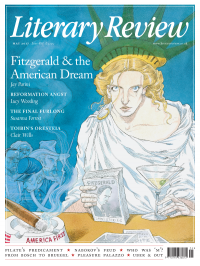Laurence Brockliss
Higher Purposes
Speaking of Universities
By Stefan Collini
Verso 296pp £16.99
Stefan Collini’s latest book consists of a series of essays, most of which have appeared elsewhere in slightly different forms, passing a critical eye over the present condition of British universities. He attributes their worrying state to two main factors. The first is the insistence of successive governments since the late 1980s that university research in both the sciences and the humanities should bring a tangible and immediate economic benefit. This, he argues, is to misconceive the purpose of university research, which is to deepen our understanding. If, in the long term, it has economic or other material spin-offs, this is an unexpected and irrelevant consequence. The second factor is the coalition government’s decision in 2010 that the cost of undergraduate teaching should be funded completely out of student fees. As outlined in the 2015 Green Paper on higher education, the level fees are to be set at is decided by linking the fee a university can charge to the perceived quality of its teaching, and by allowing new ‘for-profit’ universities to be set up alongside existing ones. For Collini, this is the beginning of the end of the British university as we know it. On the one hand, to ensure the existing level of fee income is maintained, universities may be forced to ditch old and respectable courses in response to student whims or an external audit. On the other, some universities may actually be forced to close if their student numbers drop catastrophically in the face of cut-price competition from the new commercial sector.
Collini is careful to distance himself from the conservative forces in British universities that hanker after the system that pertained for forty years after the Second World War, when higher education was largely state-funded, tuition was free and the government remained at arm’s length. It’s not that he doesn’t approve

Sign Up to our newsletter
Receive free articles, highlights from the archive, news, details of prizes, and much more.@Lit_Review
Follow Literary Review on Twitter
Twitter Feed
It wasn’t until 1825 that Pepys’s diary became available for the first time. How it was eventually decrypted and published is a story of subterfuge and duplicity.
Kate Loveman tells the tale.
Kate Loveman - Publishing Pepys
Kate Loveman: Publishing Pepys
literaryreview.co.uk
Arthur Christopher Benson was a pillar of the Edwardian establishment. He was supremely well connected. As his newly published diaries reveal, he was also riotously indiscreet.
Piers Brendon compares Benson’s journals to others from the 20th century.
Piers Brendon - Land of Dopes & Tories
Piers Brendon: Land of Dopes & Tories - The Benson Diaries: Selections from the Diary of Arthur Christopher Benson by Eamon Duffy & Ronald Hyam (edd)
literaryreview.co.uk
Of the siblings Gwen and Augustus John, it is Augustus who has commanded most attention from collectors and connoisseurs.
Was he really the finer artist, asks Tanya Harrod, or is it time Gwen emerged from her brother’s shadow?
Tanya Harrod - Cut from the Same Canvas
Tanya Harrod: Cut from the Same Canvas - Artists, Siblings, Visionaries: The Lives and Loves of Gwen and Augustus John by Judith Mackrell
literaryreview.co.uk